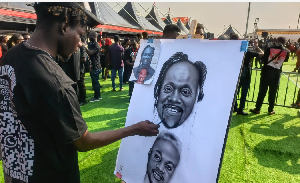Abokobi (GAR), Sept. 20, GNA - Women farmers in Abokobi in the Ga East District of the Greater Accra Region on Tuesday organised a traditional food exhibition in an effort to drum home the need to patronise local foods and promote women in farming.
The exhibition was organised by Rural Women Farmers Association in collaboration with Centre for Indigenous Knowledge and Organisational Development (CIKOD), an NGO.
It was on the theme: Women! We are the Solution for Food Security in Ghana".
Foods on display included yekeyeke, abolo, mpotompoto, kpoikpoi, tugbani, banku with okro stew, fufu with variety of soups, akyeke and bankye akakro.
The exhibition was organised as part of the three-year Pan-African campaign targeted at five West African countries, Mali, Senegal, Burkina Faso, Guinea and Ghana, to build a first mass rural women farmers movement managed by rural women farmers.
The campaign is aimed at educating women on the importance of traditional foods and their nutritional values.
Addressing the women, Madam Fatima Addy, Southern Sector Coordinator of RUWAG, noted that the association was formed to serve as a platform for rural women farmers to share knowledge and experiences on traditional farming practices.
"We seek to educate our members on the need to adopt safe and sound farming practices devoid of chemicals which are harmful to the human body."
She explained that the association also served as a platform to educate members on the values of indigenous seeds and food recipes that had high nutritional value but getting extinct due to neglect.
Mr Bernard Guri, Executive Director of CIKOD, said the campaign was to promote good practice and knowledge that had been known and handed down for generations in Africa.
He said those good practices and knowledge had sustained food sovereignty on the continent, to influence decision makers and promote better governance and value family agricultural production.
Mr Guri noted that the campaign would also build the organisational and individual capacities of selected rural women associations and their leaders, build awareness and empower rural women to engage in decision making processes in on-going local, regional and global campaigns.
The women would organise, mobilise and sustain an Africa-wide action oriented network for information sharing and advocacy.
"The impact of this campaign will be to ensure that the Rural Women Association have the skills to improve, promote and share their traditional agricultural knowledge and ensure that this rich knowledge is not lost and indeed promoted as an alternative to the Green Revolution Methods," he added.
Mr Wilberforce Laate, Deputy Executive Director of CIKOD, expressed dissatisfaction about the deplorable manner in which vegetables and other crops were cultivated.
He bemoaned instances where vegetables were forced to become ripe and ready for the market before their time by the use of chemicals which were injurious to human health.
Mr Laate expressed his dissatisfaction about the use of genetically modified crops as seeds of such crops could not be replanted after harvest due to the application of chemicals.
He urged farmers to use manure for their crops instead of fertilizer because it was cheaper and devoid of chemicals.
Regional News of Tuesday, 20 September 2011
Source: GNA












